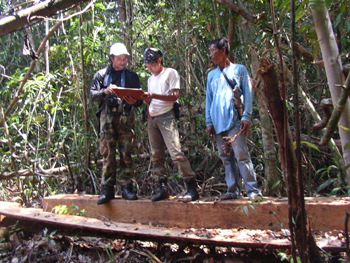
For the right to keep our community forest in Borneo (Indonesia)
INDONESIA – West Kalimantan – Katapang region – Communities of Pankal Tapang and Laman Satong
Our Foundation is supporting a project designed by a local Indonesian NGO— Yayasan Palung – to help two communities to legalise their rights to their customary forests, at the periphery of Gunung Palung National Park, home of an orangutan conservation program. Illegal timber exploitation and the massive expansion of oil palm plantations pose a serious risk to the very existence of the forests of the communities of Pankal Tapang and Laman Satong, and to the sustainable development of the region. Several communities have already chosen to sacrifice their forests to exploit their timber and/or to develop oil palm plantations. Without any confirmed rights and security of access to their land and natural resources, this decision appears logical, at least on the short time. But the timber revenues are invariably captured by a few individuals and the life cycle of an oil palm plantation is of 20-25 years. When the soil is exhausted, the production comes to an end and the communities are left in the midst of unproductive lands…
In addition, even while oil palm production is on-going, the unsustainable exploitation of the forests severely impoverishes the local environment, slashing biodiversity and its multiple economic and cultural values. In this situation, Yagasan Palung is supporting the traditional institutions of Pankal Tapang and Laman Satong to acquire a legal title to their local forests and to engage their whole communities (including Dayak indigenous peoples in Lamang Satong) to clarify and map their forest boundaries, to develop forest management structures, to agree on local regulations (peraturan daerah) and to build a common voice to campaign for their forests. In the process, the two directly assisted communities strengthen their cohesiveness and internal ties, while other communities in Ketapang are brought to consider (through a workshop and some booklets) that there are alternative options to the destruction/ monetisation of their environment. A few individuals are sufficient to carry out an illegal logging operation… but only a community in solidarity can conserve a forest!



